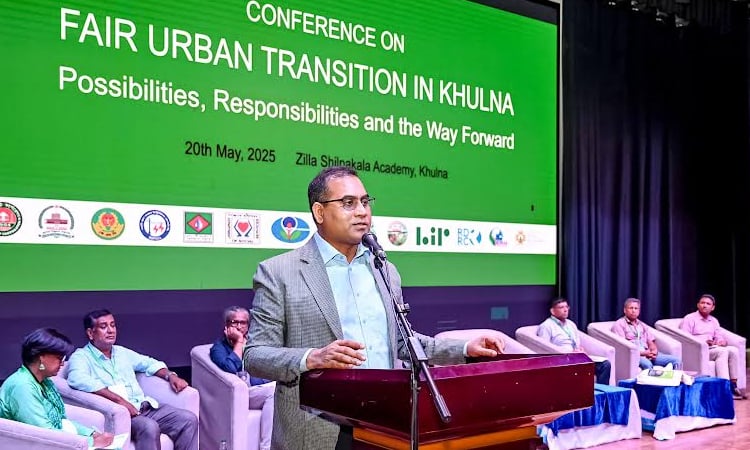News Flash
News Flash

KHULNA, May 20, 2025 (BSS) - Speakers at a conference today underscored the importance of conserving natural water bodies and called for an end to unplanned construction.
Despite many limitations, organizations involved in Khulna's urban planning and implementation should be more active and proactive to prevent such practices, they said at the day-long conference titled "Just and Inclusive Khulna City: Possibilities, Responsibilities, and Actions."
The conference was held at the auditorium of the Khulna District Shilpakala Academy.
Khulna Deputy Commissioner Mohammad Saiful Islam addressed the conference as the chief guest, while Professor Dr. Ashraful Alam, Dean of the School of Science, Engineering, and Technology at Khulna University, presided over the event.
The chief guest said this is the right time to take effective steps towards building a livable Khulna, noting that the development of the city will benefit the entire southern region.
Abir Ul Zabbar, Chief Planning Officer of Khulna City Corporation, and Md. Tanvir Ahmed, Planning Officer of the Khulna Development Authority, also spoke as guest speakers.
Professor Dr. Tushar Kanti Roy of the Urban and Regional Planning (URP) Department at Khulna University of Engineering and Technology (KUET) delivered the keynote speech, while Saifuddin Ahmed, Executive Director of Work for a Better Bangladesh, delivered the welcome address.
The conference was jointly organized by Khulna City Corporation, Khulna Development Authority, Khulna Metropolitan Police, Khulna WASA, West Zone Power Distribution Company Limited, Department of Social Services, Department of Environment, Bangladesh Institute of Planners, and several NGOs including BELA, SERAC Bangladesh, RDRC, SIAM, and the Greater Khulna Development Coordination Committee.
Various sessions of the conference focused on key urban issues, including the transition to a planned city and its significance for Khulna, youth engagement in ensuring urban justice, inclusive cities through community participation, and livable cities for all.
The coastal region is facing threats such as flooding, water salinity, drinking water scarcity, reduction of agricultural land, and other natural disasters, the speakers noted.
At this critical juncture of transformation, decisions about the city must reflect the needs of its people, ensuring justice, inclusion, and social equity. A fair, participatory, and coordinated approach is needed to guarantee access to livelihoods, resources, and civic services-especially for marginalized communities, they opined.
Addressing issues such as climate-induced disasters, limited employment opportunities, inadequate civic amenities, and lack of livability is key to making Khulna a more habitable city, they emphasized.